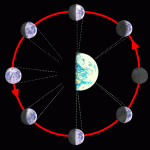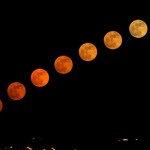
The Moon goes around the Earth, the Earth goes around the Sun, and the Sun goes around the center of the Milky Way. We know the Moon takes about 4 weeks to make its trip around the Earth, and that causes the Moon phases:
We also know that the Earth takes one year to go around the Sun, and that causes the seasons:
We also know that the Earth has been around for about 4.5 billion years, which means it has gone around the Sun about 4.5 billion times. Well, now I ask the question(s):
How long does it take the Sun to go around the Milky Way? How many times has it done that so far, and how many…
I was thinking about the timeline that brought us here, today, from the origin of the Universe up through the present day. I realized that the most uncertain thing that we know of, the step that we have the least information about, is the origin of life on Earth. All hypotheses about how life on Earth originated fall into three categories:
Abiogenesis, or the idea that life came from non-life, somehow, on Earth.
Life originated elsewhere in the Universe, and was brought to Earth, where it now thrives (e.g., panspermia, or exogenesis).
Life was created or designed by an outside force/being…
startswithabang.com reader Andy has a great follow-up to his question on the Age & Size of the Universe, and asks:
why does the CBR “appear” to come from a light sphere that “appears” NOW to be larger than the universe WAS when it first set off in a straight line on its 13.4 billion year trip???
The "CBR" stands for "Cosmic Background Radiation," and it refers to the (presently) microwave background. Here's why Andy's question is actually profound, and was known for about 20 years as either the homogeneity problem or the horizon problem. The problem is that, when we look up at the sky,…
Let me set the scene for you: I'm fresh off my Ph.D., teaching introductory physics at the University of Wisconsin. I'm trying to demonstrate how to turn potential energy into kinetic energy, and so I ask this simple question:
What is Energy?
And I get a stunned silence back from the room. One of those silences where 25 faces look back at you with eyes that say, "no, you're the one teaching us; you need to answer that one!"
And I confess, this is one of those questions that's looks like the easiest thing in the world, and yet there's no good answer for it. Put simply, energy is possibly…
As someone who's spent a lot of time in a University setting, one of the thing that often shocks me is the number of vegans that are out there. Why is it shocking? Because you need meat for proper nutrition. Now, I thought this was common knowledge, that humans are omnivores and that eating other animal products was the best way to get many of the essential nutrients your body needs. Plus, meat is delicious, and when I've gone a long time without eating it, my body physically feels better when I finally have some again.
But apparently, it isn't common knowledge, because a vegan couple…
Alright; this is a question I've been putting off for various poor reasons, but Starts With A Bang! reader Andy asks:
If Im looking at something, the light from which has taken 15 billion years to get to me, and there was only an opaque ball of radiation and stuff 15 billion years ago, why do I see formed galaxies? Shouldnt the age of the universe be: TIME LIGHT FROM OBJECT TAKES TO REACH ME + TIME TAKEN TO FORM OBJECT IM LOOKING AT?
In other words, how can I see things like galaxies that are 15 billion light years away, if the Universe isn't even 15 billion years old?! This is a damned good…
I was driving home from work at about 6:30 today and noticed the Moon, still orange, hanging low on the horizon. The lower left corner was just starting to be shadowed by the Earth. As it rose a little higher, it turned yellow and then white, as we learned it should.
Then we got clouded out, and right now, during totality, the entire sky is covered in clouds. But I started thinking, "What if I were in space?" Well, the Moon appears red/orange every day during Moonrise/Moonset from Earth, but would appear white from space. But the red/orange during a total eclipse? The Moon would still…
Alright, startswithabang-ers, Ben, my most avid commenter, saw me online while I was eating breakfast this morning, and pointed me to this new press release. Now, before you get started clicking on everything, the guy who the release is about is Brian Gaensler, who's a really nice guy, lives in Australia, whom I met at the AAS (American Astronomical Society) meeting in Austin, TX last month. Bryan's also brilliant.
Basically, what he did was he said, "well, we know what the rough density of hot gas in our galaxy is, and we can measure the timing of these pulsars to extraordinary accuracy."…
What? Is this a joke, Ethan? Have you been watching Jurassic Park again, drinking Dino DNA or something? No, I got an interesting question from startswithabang.com reader and ichthyophobe Lucas:
Over the years a few intact, frozen woolly mammoth have been found and procured by different scientists and governments, most recently Japan. What are they doing with these ancient popsicles? Cloning? Could a frozen woolly mammoth be effectively cloned?
Aaah, the woolly mammoth, something we think of as ancient, but really it only went extinct an estimated 3,700 years ago, with the last mammoths dying…
Last week, Pamela Gay over at Star Stryder pointed me to a press release which claimed that, among other things, perhaps dark matter wasn't necessary. So I wrote a guest post on her blog explaining why it was. Apparently, some people still aren't convinced. So I will lay out for you all the reasons I can think of why we need it, and explain what happens if you try to do without it.
1. Cluster Velocity Dispersions. When we take a look at galaxies, we often find hundreds or even thousands of them clustered together, like in the Coma Cluster. We can measure how quickly those galaxies are moving…
As Bonnie Tyler sang, and later The Dan Band (with more cursing),
Once upon a time there was light in my life
But now there's only love in the dark
Nothing I can say
A total eclipse of the heart
Well, it isn't the heart, but this Wednesday night, beginning at 10 PM Eastern Standard time (8 PM my time, and 4 AM Thursday morning for my European readers), there is a total lunar eclipse. One of the things that's neat about a lunar eclipse, as compared to a solar eclipse, is that you can see it from everywhere on Earth at once! If you watch it, you'll see a full moon begin to be obscured, followed…
Alright, folks, so last week I got this letter from a very good magician and television producer Anthony Owen from Objective Productions, the company partnered with Discovery Channel to make Dangerman in London:
Thank you for your recent email application for Dangerman.
If you are still interested in being considered for this role weâd like you to make a short video of yourself (no longer than 3 minutes). Tell us, on camera, why you would be the perfect Dangerman (or Woman) and explain the science behind a dangerous stunt in an entertaining way which would make sense to a non science-…
So I am preparing an audition video to be Dangerman this weekend, which will go up on youtube and get posted here next week. In the meantime, as promised for the weekend, I have a new weekend diversion for you: the archer fish, a.k.a. toxotes jaculatrix (hee hee). But what makes it so cool? Oh, I don't know, how about this slow-motion video:
Did you see that?? It's a fish that hunts insects by shooting them with water, and then eating them when they fall into the water, often catching them before they ever leave the air! What's really amazing about this is that the fish needs to be able to "…
Three awesome things are going on today for you, and I invite you to check them all out:
The latest Carnival of Space is live, where you have your choice of 23 different astronomical topics to choose from. Of course, my post this week on galaxies and how they're made is on there, too!
Pamela L. Gay, cohost of Astronomy Cast, blogger of Star Stryder and all-around great person, saw a press release this week about whether we need dark matter and dark energy. The answer, of course, is yes, but since I'm an expert on that stuff, she came to me and asked me to give my analysis of the…
The closest you're going to get from me on Valentine's Day is something red, dear readers. As the Moon is now a waxing gibbous and will be for the next week, it will brighten the sky for the majority of the night. But before sunrise, it will dip below the horizon and set. The funny thing is, if you've ever watched this (or watched a waning gibbous rise), you'll notice it changes color! In fact, this composite photo shows you what I'm talking about:
So the Moon, although white once it gets high up into the sky, appears yellow, orange, or even red when it's close to the horizon. I got a…
I've been talking about dark matter a lot, and yet there's still so much to explain about it. For example, dark matter and normal matter (protons, neutrons, and electrons) have a few things in common:
They both have mass.
They both feel the effects of gravity.
They both cause their own gravity.
But that's where the similarities end. I can make a long list of the ways that dark matter and gravity are different from one another, but I prefer to give you an example. Imagine the following scenario: you stand up from your seat, walk towards the wall, and smack right into it. You might wind…
Last week, Jamie (my significant other) came home from work and told me about a conversation she had with her coworker, Chris. This week she asked another one, Miguel, whether he had any questions about Astronomy, Physics, space, etc. This week's question comes from Miguel:
What is a galaxy, anyway? Why does it look like a big bright fuzzy star? And why are there different types of galaxies; shouldn't they all be the same?
This might come as a surprise, but 100 years ago, it was pretty much accepted that we were the only galaxy in the Universe. In fact, there was a great debate in 1920 on…
Ever get sick of your life here on Earth? What about really getting away from it all; what if you wanted to live in space, orbiting the Earth, away from everyone. (At least for awhile, like a summer home.) What would you need to do it, and what would it consist of?
I propose an idea which I'll call a "space house," where I'll go through what I think is the cheapest and easiest way to get all the things you would need to comfortably survive in space for an extended period of time. First off, let's go over all the things a human would need to survive, while still having a good life, in space…
Starts With A Bang! is off to a great start; each the past three days we have topped the 100 visitor mark, bringing our total number of unique visitors up to 1,413! I'm going to attempt to start a new tradition here of making a weekend post on a topic that I just find neat, and share it with you. This first Weekend Diversion is an optical illusion about color. Take a look at the image below:
Looks like a cube with a bunch of different colors on it. Now do the following:
Look at the top face of the cube, and tell me what color the tile in the middle of that face is.
Look at the near face,…
To follow up on the faster than light post here, let's ask another question:
If you can make a way of transferring information that doesn't involve matter, is that information limited by the speed of light?
First off, let's go over what information is, and then we'll talk about how transferring information without matter is even possible. Information is anything that's organized in a meaningful manner. Take a look at the following three sentences:
This sentence contains some information.
Tihs scnnteee cainntos smoe imnfriatoon.
Not a imfro nimsoe mnoisn ctrnsnet sihto.
Each of the three…













